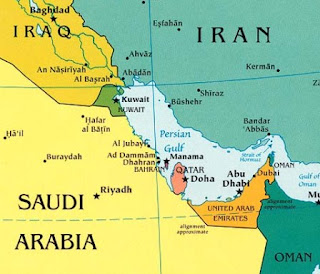Re-uploaded by request 2/24/2023.
Although this music was recorded in Doha,
Qatar, it’s really a bunch
of Iraqi expats hangin’ out in Qatar.
But what the hell. I’m trying here.
Music Of Islam
(Celestial Harmonies Series): The Music of Islam, Volume Four embraces some of
the most beautiful Islamic music from Qatar, featuring the oud & various
percussion instruments, performed by Iraqi master musicians who keep their
music traditions alive in Doha.
This is an invigorating
set of music recorded by oud master Mohammed Saleh Abd Al-Saheb Lelo &
percussionist Haitham Hasan. Exploring the various modes ("maqam")
& rhythmic meters ("wazn") of Arabic music, the two move from
brisk, aggressive tempos to unmetered solo pieces, like the beautiful,
virtuosic oud solo that begins "Ya Gariya Khabirini," where the
distinctive grainy, penetrating tone of the oud is suddenly joined by a
propulsive four-beat feel from Hasan, who overdubbed tabla, kasur, tar, &
other drums to create the layered bed of rhythm that makes this album so
remarkable, if somewhat unorthodox.
Part Four of a 17-CD
collection of Islamic music from Celestial Harmonies…all, like this one,
boasting excellent liner notes, top-notch sound, & in-depth background
information.
Various - Music of the Arabian Peninsula: Doha, Qatar,
Celestial Harmonies 13143-2, 1997.
Tracklist -
Quam Na Dimi
Ish Lonak Ini
Taqsim 1
Ya Gariya Khabirini
Al Hajr
Marou Alyaa El-Helwen
Taqsim 2
Bead Konto
Lama BadaYatasana
Taqsim 3
Ya Helo Ya Abu El-Sedara
The music of Qatar is traditionally based on Bedouin poetry, singing, & dancing. Most Qataris listen to Khaliji music which is derived from this style of the traditional Bedouin music. Khaliji music dominates the airwaves in the capital Doha as well as most of the rest of the country. The music is basically accompanied by the oud, the rebaba, & the Arabian flute, with an array of percussion instruments, including al-ras (a large drum whose leather is heated by an open fire), tambourine, & cymbals, along with numerous small drums.
Ali Abdel Sattar was born in Qatar. His love for singing led him to participate in the Gulf singing sessions when he was twenty years old. His real beginning in the world of art was with the hit song "Ya 3alam Ouhibouh". From that point on Ali Abdel Sattar began to attract the attention of larger & larger audiences.
He is one of the most respected Qatari musicians. Fans, music critics, & journalists have nicknamed him ‘The Emir of the Qatari Song’. He has performed in live concerts & participated in festivals throughout the Arab world. He was honored in 1999 by the Arab University as one of the pioneers of Arabic modern music. The lyrics of many of Sattars greatest hits were written by Khaled Abdurahman, himself a musical legend.
Ali Abdel Sattar – The Best of…, RotanaAudio, 1990-2000.
Tracklist –
Mahllaha
Yetimah
Adai Aleik Belhob
D’e Alayam Tf’el Ma Tsha’
Ya Nas Ahba
Soukar Zeyada
El Qalb
Ya Dar
Sevgilim
This goes out especially to critic Hammer from evil Western Satan
worshipper Natas Nothin’. Naser Mestarihi is a Doha, Qatar based musician,
singer, & songwriter who prides himself in creating music that is true to
the roots of good old rock’n’roll. On his latest effort 1987 just
released this June, he expands that dedication into a fully fledged affair.
Naser Mestarihi was born on October 14, 1987 in Doha, Qatar.
He is a guitarist who has been on the Qatari music scene since the age of 15.
Naser is a self-taught multi-instrumentalist (guitars, bass, vocal, &
drums) singer-songwriter who is the first rock musician to ever formally
release a rock album out of Qatar.
Naser has been playing live shows professionally with several bands since 2004.
Naser began his solo career in 2007. Given the musical climate of the
fundamentalist Middle East for non-Arabic
music, he hasn't performed many shows. He has performed a few shows in the United Arab Emirates
as a solo artist & as a session musician for other bands. He began
recording his debut studio album in December 2009, the eponymous Naser
Mestarihi EP.
Here is a track from his latest release.
Naser Mestarihi – Exodus Highway from 1987, 2013.
Rock evil,
NØ







i read a lot of stuff and i found that the way of writing to clearifing that exactly want to say was very good so i am impressed and ilike to come again in future..
ReplyDeletearabic oud instrument
I would love a reup of the Music of Islam and the Ali Abdel Sattar links if possible. Thank you!
ReplyDeleteAll links fixed. Enjoy.
Delete